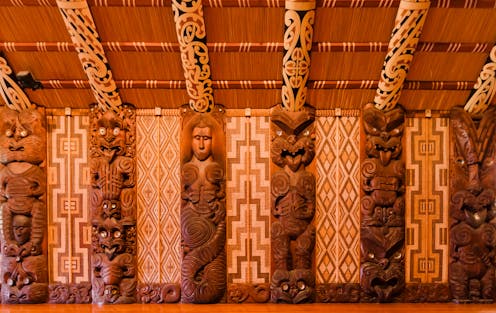Tokenism and te reo Māori: why some things just shouldn’t be translated
- Written by The Conversation

In 2017, the Whanganui River was made a person in the eyes of the law. The Te Awa Tupua (Whanganui River Claims Settlement) Act acknowledged, in its own way, that the human world includes other, more-than-human entities.
It was perceived at the time as quite a radical step for the law, and it is undoubtedly legally significant. But this profound interconnection that underpins all things has been self-evident for Māori and other Indigenous peoples for millennia.
With all things in the world possessing one fundamental essence, any single object owes its existence to everything else. Within one object, everything else resides. The Te Awa Tupua Act took a conceptual step towards recognising this in law.
Depending on who one is talking to, these metaphysical concepts may be called spiritual or holistic, or they may have no label. But it is clearly important that we employ a language that accommodates this thinking, and that its terms are treated with the integrity they’re due, even in the political sphere.
Te Reo Māori is often invoked as one such language – a spiritual taonga, gifted by human and non-human ancestors, and imbued with their presence. It registers the more-than-human realm – Te Po (night), Te Kore (nothingness), and so on – while talking about a single thing.
These more abstract dimensions of te reo Māori, however, can clash with the generally more instrumentalist use of language in policy and law.
Deeper meanings
So it was that earlier this year Justice Minister Kiritapu Allan objected to the tokenistic use of te reo Māori in government departments. Other Māori have objected to this too, and the issue also arises in the debates around science and mātauranga Māori, and tikanga and law.
The problem, one suspects, relates to the overuse and inappropriate use of te reo Māori. Indeed, there may be times when the taonga status of the language can only be honoured when we decide not to use te reo in certain circumstances.
With these political and philosophical concerns at the forefront, one arm of my research has been to examine – from a Māori vantage point, where all things are interconnected or “one” – how a Māori text does not essentially connect with its English translation.
Read more: Three rivers are now legally people – but that's just the start of looking after them
With Kiritapu Allan’s challenge in mind, and in light of this year’s 50th anniversary of the Māori language petition itself, consider the position of te reo Māori in policy and legal texts. From a Māori perspective of the interconnectedness of things, there is a particularly isolating, divisive tendency in English, which diminishes full Māori meanings.
Words such as “whakapapa” and “whanau”, for example, often lack their more holistic dimensions in these contexts. Ironically, they have no whakapapa or whanaungatanga with the text. The surrounding English text in law and policy will emphasise measurable, tangible things, whereas te reo terms always refer to intangible worlds as well.
The problem for te reo Māori in these situations is that a term’s “essence” – some might call this its “wairua” – has been modified to refer and equate to an English language term, and also to conform to a colonising worldview in the background.
The Māori worldview
As I said earlier, this worldview is isolating. It separates out things in the world, it actively rejects their togetherness and their relationship with the more-than-human, and it inhibits te reo Māori’s ability to transcend human existence.
We see a warping of te reo Maori in these circumstances – a negating of its spiritual character in order to refer to more tangible things. “Whakapapa” in those instances merely refers to genealogy, “whanau” to human family.
Te Wiki o Te Reo Māori offers a chance to recall and honour the work of those who have fought to increase the number of Māori speakers. Through their efforts we’ve seen the language flourish in areas we would never have dreamed of only a decade ago.
But with the language now being so widely deployed in previously unforeseen ways and contexts, it’s also timely to think about how the spiritual reality of te reo should be preserved against these colonising backdrops.
When English will do
This is just as important as the effort to have te reo widely used. Sometimes the two camps may not agree with each other, either. It might involve, for instance, not being scared to reject an offer to use te reo Māori in certain forums.
Wherever we see the naturally expansive nature of te reo Māori being “disciplined” by other registers of language, we need to consider withdrawing it. We would simply advise policymakers and legislators to use English terms if they are referring to a non-Māori worldview.
This might seem unthinkable for many, given the apparent push to use te reo Māori at every opportunity to ensure its survival. But it would also be the face of a deeper mission to ensure te reo Māori accords with a Māori worldview.
Instead of being forced to act as a receptacle for a colonising worldview, te reo Māori could “take a breather” to allow Māori to discuss the issue in more depth. After that, it might be that our precious terms are returned to the text with special provisos – or maybe not at all.







